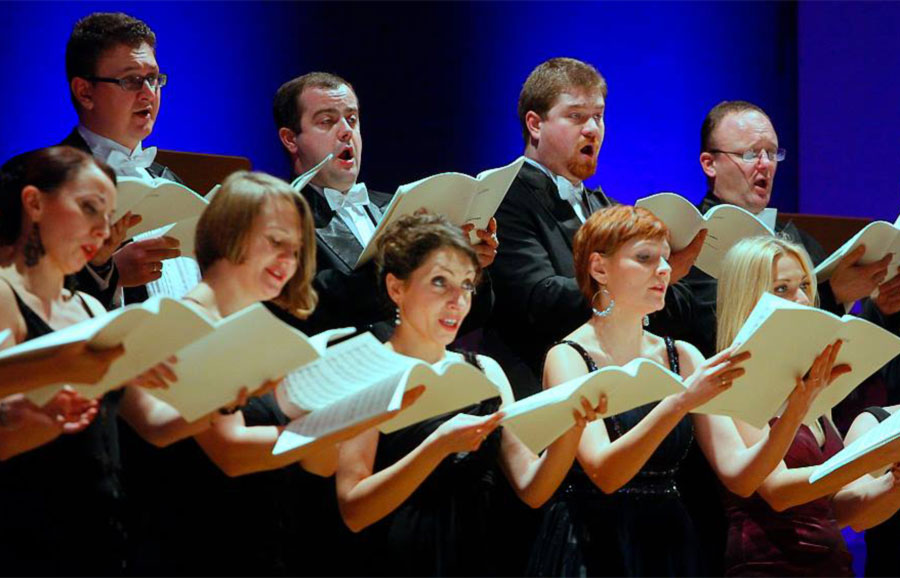On the 14th August, 1966 the first sounds of Wratislavia Cantans were heard. That is how one of the most important classical music festivals in Poland and in this part of Europe began. Today, reviving the concert from half of a century ago, we're beginning the celebration of the anniversary of Wratislavia Cantans.
September evening, a church, an oratory piece from several hundred years ago (e.g. one of Bach's Passions or Händel's Messiah) — these are typical associations with Wratislavia Cantans. However, the first festivals took place in August, lasted merely several days, and the first concert was organized in the Studio of Polish Radio. No vocal form was performed during inaugural concert, only the collection of pieces related to each other by their singing elements. With only one exception of Zieleński's Magnificat, music performed during this concert was exclusively modern, or “latest” one might say. Nowadays, the audience is often surprised with the presence of new music at the festival, while in the programme manifest — so called Invocation, the founder of Wratislavia, Andrzej Markowski wrote: “Musicians performing at this festival should choose unknown or not performed before pieces of Polish composers.”
What did the audience from the '60s expect from the festival? How did it react to baroque pieces which were so rarely performed at that time? How did it respond to the avant-garde in music which fascinated composers of these times? Did the audience expect that the pieces from the programme of the first concert would stand the test of time?
After half of the century we still listen to excellent Polish baroque music, perhaps even more often that in the '60s. The hymn Magnificat from the collection of Offertoria et communiones totius anni proves the high class of Mikołaj Zieleński's works inspired by Venetian polychoral style. And it was also in Venice where the works of Polish composer were published in print. Biographical note of Krzysztof Penderecki in the first programme book was quite brief: “Winner of numerous awards. Apart from composing, he is also involved in pedagogical activities.” His Psalms of David were honoured with 2nd prize in the memorable competition of the Association of Polish Composers in 1959, when an unknown assistant professor — Penderecki — received three highest awards. He combined music containing elements of atonality and punctualism with the Psalms translated by Jan Kochanowski. Cinq rechants by Olivier Messiaen demonstrates the power of vocal. We will hear orchestra effects achieved solely with the use of a human voice without any musical instruments. Messiaen is also the author of lyrics for this piece, written in transformed French and in made-up language, formed from syllables selected on the basis of their sound value.
Other pieces from the first Wratislavia programme did not stand the test of time as strongly. La espero (Hope) composed by Andrzej Koszewski merely three years before the festival was written to the lyrics of the Esperanto speakers written by Ludwik Zamenhof, the creator of Esperanto. “The strongest applause was given [by the audience] to Poèmes de Jean Tardieu by Constantin Regamey, which made the performers play an encore of the last part of the piece,” as can be read in 1966 review. Wierchy ballet by Artur Malawski, dedicated to the highlanders from Podhale, is unusual for its complex percussion section. How would today's audience enjoy the 1966 festival? Would we have liked the first programme of Wratislavia? There is one way to find out — join us in visiting the past!

Chór NFM, fot. archiwum
Wratislavia Cantans
Wratislavia Cantans 1966–2015: Overture!
06.09.2015
Sun.
7:00 PM
NFM, Main Hall
Programme:
M. Zieleński Magnificat
A. Koszewski La espero
O. Messiaen Cinq rechants
K. Regamey L’alerte, La sécurité, L’affaire se complique, La môme néant from Cinq poèmes de Jean Tardieu
K. Penderecki Psalms of David
***
A. Malawski Peaks
Performers:
Benjamin Shwartz – conductor
Iwona Hossa - soprano
Tomasz Zagórski - tenor
Jarosław Bręk – baritone
Cantores Minores Wratislavienses
Piotr Karpeta – artistic director
NFM Choir
Agnieszka Franków-Żelazny – artistic director
Chór Opery i Filharmonii Podlaskiej
Violetta Bielecka - artistic director
NFM Symphony Orchestra
